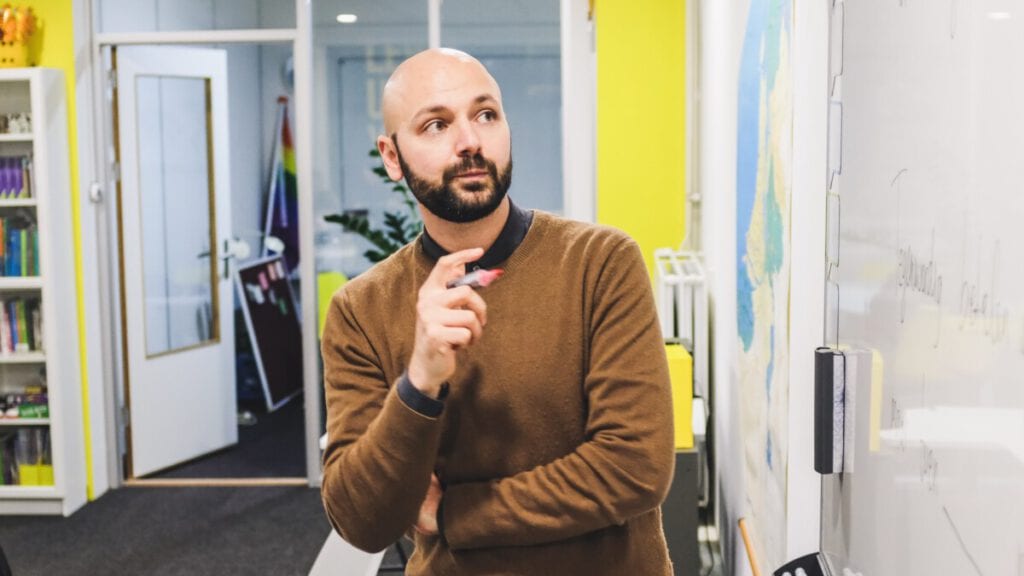Whether your feet have just touched Dutch soil or you have been living in the Netherlands for 20 years — the prospect of learning this wonderfully guttural language can be a scary one.
As an international in the Netherlands myself, I get it. You’re probably listening in to conversations that consist of multiple “ooh”, “ghuhh”, “aggh” sounds and thinking, “nope, never going to compute.”
But now, writing this article as a Dutch language teacher, I can confidently say it is indeed possible for you to engage in a Dutch conversation.
Let’s start with the first tools you’ll need in your box and run through the basic components of a Dutch conversation: “hello”, “how are you?”, and “goodbye!”
A language expert’s guide to basic Dutch phrases
We’ve teamed up with the wonderful Mirko from TaalBoost, a Dutch language school based in Amsterdam.
Being a non-native himself who first came into contact with the Dutch language as an adult, he translates his experience and knowledge through TaalBoost’s approach: how the Dutch language can be learned most effectively.

How do you say “hello” in Dutch?
There is this funny story about how the rather recent word “hello” came to be used in the English language.
With the emergence of the telephone some 150 years ago, two rivals Thomas Edison and Alexander Graham Bell used and promoted different ways of answering a phone call.

Where Edison succeeded in putting “hello” in widespread use, Bell advocated for the nautical term “ahoy.”
The Dutch must have thought — why not both? — as nowadays the customary words used to greet someone in the Dutch language are precisely hallo and hoi. Both words can be used interchangeably or even together.
Tip: while it’s standard to greet someone in non-formal situations by saying either hallo or hoi in Dutch, it’s not common to use those words while actually answering the phone.
Most Dutchies introduce themselves by saying their (first) name immediately after they pick up a phone call. For example, I would say “met Mirko”, which is short for “u spreekt met Mirko” — meaning “you are speaking with Mirko.”
Casual ways to say “hello” in Dutch
Hoi is an informal greeting. When addressing more people at the same time, one would generally say “hoi allemaal” or “hallo allemaal” — which is Dutch for “hi y’all.”
Other informal ways of saying hello are hé (pronounced as hey), hai (pronounced as hi) and ha.
Luckily, most daily encounters are also informal encounters in the Netherlands — unless you are talking with a person much older than you, a civil servant, or a member of the royal family (but who knows, maybe you’ll stumble across King Willem-Alexander one day in the Westerpark.)
Formal ways to say “hello” in Dutch
Should you find yourself face to face with a royal family member, it is best to remember that in a formal situation, you are not expected to use hoi or any other greeting mentioned so far.

To be on the safe side, use:
- Goedemiddag — good afternoon,
- Goedemorgen — good morning,
- or goedenavond — good evening, depending on the time of day.
A shortened version of goedemiddag is dag, which can be used both formally and informally.
If you feel like tipping your hat and curtseying more often, “dag meneer” (meaning good day, sir) or “dag mevrouw” (good day, madam) are common ways of addressing people formally.
Seven ways to say “hello” in Dutch
How do you ask “how are you” in Dutch?
That world-famous Dutch directness is surprisingly absent when it comes to asking someone how they’re doing.
In Dutch, you don’t actually ask the person how they are, but how things are going or how life is generally.
This is conveyed by three words: “hoe gaat het” (how is it going) or “hoe is het?” (how is life/how are things?).
“Hoe gaat het?” — three words for a variety of situations
Although the right pronunciation of “hoe gaat het?” can be somewhat of a challenge, the usage of these three words is fixed and used across the board.

Whether you are addressing one person or multiple people, in formal or informal situations, speaking to a person directly or referring to someone else — it’s always “hoe gaat het?”
If you need to be more specific, and sometimes you do, then you’ll glue an additional met to the original question, followed by the person you are referring to. For example:
- “Hoe gaat het met je?” — How are things with you?
- “Hoe gaat het met je familie?” — How are things with your family?
- and “Hoe gaat het met Joost?” — How are things with Joost?
“Hoe gaat het?” is an open question. That means that you can answer anything in the wide range from uitstekend (outstanding) to verschrikkelijk (terrible).
READ MORE | How to fake your way into speaking Dutch (in 5 steps)
But beware, the phrase is a conversation starter or a useful small talk tool — people aren’t actually expecting you to share your deepest, darkest worries.
“Alles goed?” An essential Dutch phrase — simple to both ask and answer
You can avoid the open question and ask whether things are going well by posing a closed question instead.
Closed questions just need a mere ja (yes) or nee (no) as an answer — perfect for the sprouting beginner!

You’ll find that these questions always start with alles and end with a raised intonation of the last word to make it sound like a question phrase. For example:
- “Alles goed?”,
- “Alles oké?”
- or the more informal “alles lekker?”
- and “alles kits?”
If you’re looking for a more adventurous variation, there’s also “alles Gucci?” (a popular phrase amongst the current generation of slang users).
Another popular way of asking how someone is in slang is “fawaka” — borrowed from Sranantongo, one of the official languages of Suriname.
Seven ways to ask “how are you?” in Dutch
Still following? Great — now let’s listen over some of this new vocab! Here are seven ways to say “How are you?” in Dutch:
How do you say “goodbye” in Dutch?
The routine way of saying goodbye in Dutch is “tot ziens,” which literally means “until we see each other.” Best of all, it can be used in practically any situation.
I love the hopefulness and optimism contained by these two words as they imply that you will be seeing the other person again.
The more archaic variation of “tot ziens” would be “tot weerziens” (meaning “until we see each other again”), while a more casual version would be “tot kijk” (the same meaning).

But let’s face it, nowadays it would be more applicable to say something along the lines of:
- “We bellen” — We’ll phone,
- “We mailen” — We’ll email,
- or “We appen” — We’ll text.
Starting your goodbye with tot and then adding a timeframe to it would still be the most usual and productive way of parting ways.
Don’t worry; you can still be non-specific if you like: “tot de volgende keer” (until the next time) or “tot snel” (until soon.)
How to say “goodbye” in Dutch — time-specific
However, if you are one of those people who actually know what they will be doing a couple of hours/days/weeks into the future — like many Dutchies do — you can be more specific by saying:
- “Tot vanavond,” — until tonight,
- “Tot morgen” — until tomorrow,
- “Tot volgende week” — until next week,
- “Tot straks” — until later,
- and “Tot zo” — see you soon.

A common confusion among fresh (and some seasoned) Dutch language learners is the meaning of straks or zo in Dutch.
Although they would be translated as soon, in Dutch they are a very specific kind of soon — between ten minutes and three hours from now. Instead, straks or zo would be better translated as the phrase “in a bit/while.”
How to formally say goodbye in Dutch
Just like goedemiddag can be used to formally say hello, it can also be used to say goodbye, but only in an extremely formal setting.
Aside from the news anchors saying it at the end of the news (it’s that formal), I’ve never heard anyone under the age of 70 say goedemiddag or goedenavond when leaving in real life.
How most people say “goodbye” in Dutch
What you are much more likely to hear — basically from any cashier at a supermarket or at any store — is “fijne dag,” “fijne avond” or “fijn weekend,” meaning “have a nice day/evening/weekend.”

By the same token, you can use dag to say both hello and goodbye. The word is technically formal but there are ways to dress it down a bit.
For example, you could double it as dag-dag, or you could transform it to doeg and finally doei.
The word doei is by far the most common way of saying goodbye in an informal setting. Other informal ways of saying goodbye are later(s) and (a personal favourite) — joe.
Finally, out of all three phrases — “hello”, “how are you”, and “goodbye” — saying goodbye has by far the vastest regional differences. For example:
- In the province of Gelderland, it is common to say ajuu(s),
- In North-Brabant houdoe,
- In Limburg and in the Randstad metropole area (especially Amsterdam and Rotterdam), it is not uncommon to hear de mazzel — a word borrowed from the Yiddish and Hebrew saying, mazel tov — which means good luck!
@dutchreview Nee dankje, I don’t need the ‘bon’ 😏 #dutchreview #reels #expatlife #netherlands #nederland #lifeinthenetherlands ♬ original sound – DutchReview
Seven ways to say “goodbye” in Dutch
Congratulations, you’ve navigated a basic conversation! Now, let’s listen to seven ways to bring it to a close and say goodbye.
Keep the conversation going! Learn Dutch with TaalBoost
Hungry for more Dutch conversation? Great! There are many ways that you can learn to master the Dutch language.
Whether you want to tell your housemate about that weird dream you had last night or talk back when someone gets sassy with you in the cycle lane, the best way to improve your Dutch skills is to enrol yourself in a TaalBoost language course.
Online TaalBoost Dutch language courses are the ultimate solution for interactive, engaging, teacher-guided and feedback-driven Dutch language learning at all proficiency levels. Level up your Dutch during one of the many TaalBoost Dutch language courses on offer:
- 6-week online evening Dutch courses
- 6-week online day Dutch courses
- 10-week online Saturday Dutch courses
Did you know all these Dutch phrases? Let us know some of your favourite Dutch vocab in the comments below!

Goedemiddag can also be used as a goodbye by people aged younger than 70. In customer services, when a client is just flat out rude, you can end the call with something along the lines of:”I am done with this conversation, goedemiddag!”and then hang up. Here the “goedemiddag” serves as a polite but clear fuck you.